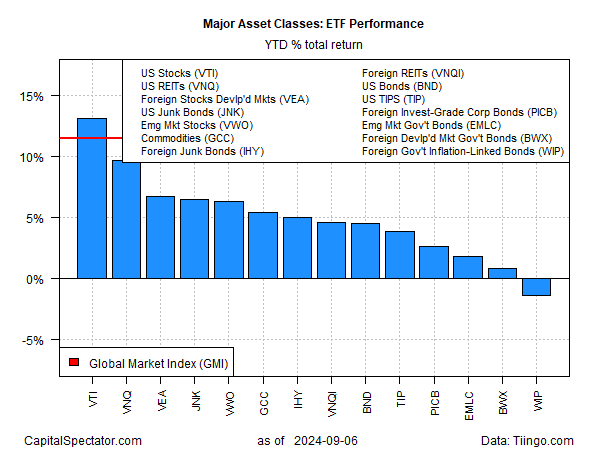American shares suffered their deepest weekly decline in more than a year last week, but the setback wasn’t enough to dethrone US stocks as the world’s top-performing asset class in 2024.
Based on a set of ETFs tracks the major asset classes through Friday’s close (Sep. 6), US equities are still leading the field by a wide margin.
Vanguard Total US Stock Market (NYSE:VTI) is up 13.1% in 2024. While that’s well off the 18% YTD rise the ETF enjoyed at several points earlier in the summer, the current advance still leaves the performance crown firmly in place.
The recent rebound in US real estate investment trusts has handed this market the second-best performer award this year.
Vanguard Real Estate (NYSE:VNQ) closed with 9.7% total return on Friday. Excluding US stocks, VNQ’s year-to-date rise is comfortably ahead of the global competition.
Despite the ongoing US leadership in equities, analysts are again questioning if American shares can hold the pole position for the remainder of the year. The Wall Street Journal observes that September’s reputation for stocks is harsh:
“Going back to 1928, the S&P 500 has declined an average of 1.2% in September, the weakest month of the year for stocks. The index ended lower 56% of the time over that stretch, according to Dow Jones Market Data.”
Markets this week will be focused on the consumer inflation report for August (Wed., Sep. 11), which could influence expectations for next week’s Fed decision on interest rates.
Economists are expecting that CPI inflation will dip to 2.6% from 2.9% previously for the year-over-year trend, based on the consensus point forecast. Core CPI is projected to hold steady at 3.2%.
Although both measures remain above the Fed’s 2% inflation target, the forecasts don’t call into question the recent disinflation trend.
It’s debatable if rate cuts will create a new round of upside momentum for US stocks. By contrast, leaving rates unchanged at the Sep. 18 FOMC meeting would surprise the crowd. But Fed funds futures are pricing high odds for a cut.
The mystery is whether a rate cut will offset growing concerns that the US economy is losing altitude.
Friday’s payrolls report, although posting a firmer pace of hiring, wasn’t strong enough to dismiss recession fears across the board.
“Unfortunately, [the August] jobs report doesn’t entirely resolve the recession debate,” says Seema Shah, chief global strategist at Principal Asset Management.
